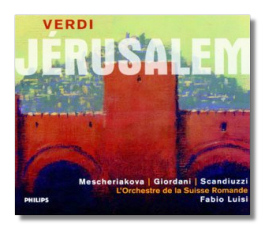
The Internet's Premier Classical Music Source
Related Links
- Verdi Reviews
- Latest Reviews
- More Reviews
-
By Composer
-
Collections
DVD & Blu-ray
Books
Concert Reviews
Articles/Interviews
Software
Audio
Search Amazon
Recommended Links
Site News
 CD Review
CD Review
Giuseppe Verdi

Jérusalem
- Marina Mescheriakova (Hélène)
- Marcello Giordani (Gaston)
- Roberto Scandiuzzi (Roger)
- Philippe Rouillon (Le Comte de Toulouse)
- Daniel Borowski (Le Légat)
- Simon Edwards (Raymond)
- Hélène Le Corre (Isaure)
Choeur du Grand Théâtre de Genève
L'Orchestre de la Suisse Romande/Fabio Luisi
Philips 462613-2 DDD 3CDs 48:14, 48:14, 72:28
This is the first complete recording, in French, of the opera that Verdi assembled out of I Lombardi, a tale of guilt and redemption set at the time of the Crusades. The original work was premièred in 1843 at La Scala. Jérusalem appeared for the first time at the Paris Opéra in 1847. Then it was translated back into Italian, and Gerusalemme was produced at La Scala in 1850. I Lombardi has been the most popular of three in the modern era, even though critics are quick to criticize the unlikely plot, the clichéd libretto, and Verdi's music, which ranges from the inspired to the routine. (For example, there is a Chorus of Pilgrims that sounds like a pale imitation of "Va, pensiero" from Nabucco, the immediate predecessor of I Lombardi.)
Listeners familiar with the original opera will note many changes in Jérusalem, apart from the obvious language differences. The plot has been altered in many ways, the setting of Act One has been moved from Milan to Toulouse, and all the character names have been changed (to protect the innocent?) The ballet-loving Parisians were given a 20-minute suite of dances at the start of Act Three, which is a harem scene. This music is included here, and it is pleasant enough, although it is not at all original, and it puts the action to a grinding halt. Philips's commentator notes that "all that was embarrassingly naïf in I Lombardi is discarded," but I am sure there are many listeners who will miss the violin solo that precedes the Act Four trio for the soprano (Giselda/Hélène), tenor (Arvino/Gaston), and hermit bass (Pagano/Roger). A striking addition to Jérusalem is a scene in which Gaston, falsely accused of murdering his would-be father-in-law in Act One, defends himself from the charge in a ritualistic judgment scene that prefigures Radames's trial in Aïda. Musically, there is much about this opera to enjoy, but one has to get through commonplace material to get to those parts. Nevertheless, this is an important release to commemorate the hundredth anniversary of the composer's death.
The cast is largely unfamiliar to me. Marina Mescheriakova executes Hélène's coloratura fairly well, and her voice is attractive if not distinctive. Marcello Giordani is a tenor whose voice resembles that of José Carreras, and he (with Mescheriakova) could go far if he doesn't force himself; high notes already exhibit strain. Roberto Scandiuzzi is the most effective actor of the three leads. The smaller roles are cast solidly, and the chorus is very fine. Collectors might have flashbacks of Ernest Ansermet when they hear this chorus and orchestra; they made many recordings with that master conductor in the 1950s and 1960s. L'Orchestre de la Suisse Romande still can sound raw, but the personality that they had under Ansermet is not totally effaced. Fabio Luisi is a conductor who could contribute much to the Verdi scene, and I hope to hear more from him. Philips's engineering in splendid, and the booklet is attractive and informative.
Copyright © 2001, Raymond Tuttle


















